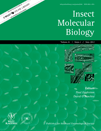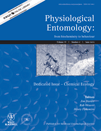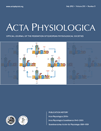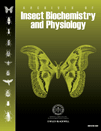
COMPARATIVE BIOCHEMISTRY AND PHYSIOLOGY A-MOLECULAR & INTEGRATIVE PHYSIOLOGY
Scope & Guideline
Advancing the Frontiers of Molecular and Integrative Physiology.
Introduction
Aims and Scopes
- Comparative Physiology and Biochemistry:
The journal emphasizes the comparative study of physiological processes and biochemical pathways across diverse organisms, facilitating insights into evolutionary adaptations and functional ecology. - Molecular Mechanisms:
Research often delves into the molecular underpinnings of physiological responses, including gene expression and protein interactions, to elucidate how organisms adapt to environmental stressors. - Integrative Physiology:
The journal promotes studies that integrate various physiological systems, such as cardiovascular, respiratory, and metabolic responses, to provide a holistic view of organismal biology. - Ecophysiology:
A significant focus is placed on how environmental factors, such as temperature, salinity, and hypoxia, influence physiological and biochemical processes, particularly in aquatic and terrestrial organisms. - Stress Response Mechanisms:
The examination of stress responses, including hormonal and immune adaptations, is a recurring theme, highlighting how organisms cope with challenges such as climate change, pollution, and habitat alteration. - Evolutionary Physiology:
Research often explores the evolutionary implications of physiological traits, linking adaptations to survival strategies in changing environments.
Trending and Emerging
- Climate Change Adaptation:
Research focusing on how various species adapt physiologically and biochemically to climate change is gaining prominence, reflecting the urgent need to understand resilience mechanisms. - Microbiome Interactions:
Studies investigating the role of gut microbiota in influencing host physiology and health are increasingly featured, highlighting the importance of symbiotic relationships in ecological physiology. - Omics Approaches:
There is a notable rise in the application of omics technologies (genomics, proteomics, metabolomics) to explore complex physiological responses, providing deeper insights into organismal biology. - Physiological Plasticity:
Research examining phenotypic plasticity in response to environmental variability is on the rise, as it reveals how organisms can adjust their physiology to cope with changing conditions. - Health and Disease Models:
The journal is increasingly publishing studies that utilize animal models to investigate human health and disease mechanisms, bridging comparative physiology with biomedical research. - Neurophysiology and Behavior:
Emerging studies are focusing on the links between physiological processes and behavioral adaptations, particularly in relation to stress responses and ecological interactions.
Declining or Waning
- Traditional Laboratory Studies:
There has been a noticeable decrease in studies relying solely on traditional laboratory setups, as researchers increasingly favor field studies and ecologically relevant experiments that reflect real-world conditions. - Single-Species Focus:
Research that concentrates exclusively on a single species has waned, with a growing preference for comparative studies that assess physiological responses across multiple species or taxa. - Basic Physiological Mechanisms:
While foundational studies on basic physiological mechanisms remain important, there is a trend towards more applied research that addresses ecological and conservation issues, which may lead to less emphasis on purely mechanistic studies.
Similar Journals

INSECT MOLECULAR BIOLOGY
Advancing the Frontiers of Insect GeneticsInsect Molecular Biology, published by Wiley, is a leading journal dedicated to advancing the field of insect biology through molecular perspectives. With a prominent ISSN of 0962-1075 and an E-ISSN of 1365-2583, this journal has gained a significant reputation since its inception in 1992, showcasing a diverse array of research that spans across genetics, molecular biology, and specific aspects of insect science. As of 2023, it has achieved a remarkable categorization, recognized as Q1 in Insect Science and Q3 in Genetics and Molecular Biology, underscoring its pivotal role in fostering academic discourse at the intersection of biology and technology. The journal is indexed in esteemed databases with strong rankings, sitting at the 82nd percentile in Insect Science, which highlights the impactful research it publishes. While it currently does not offer open access, Insect Molecular Biology remains an essential resource for researchers, students, and professionals eager to explore the complexities of insect life at the molecular level. By disseminating innovative findings and methodologies, the journal significantly contributes to both theoretical and applied entomological research, making it a cornerstone for anyone passionate about the intricate world of insects.

YEAST
Pioneering insights into the science of yeast since 1985.YEAST is a renowned peer-reviewed journal published by WILEY, dedicated to advancing the understanding of yeast biology and its applications in various scientific fields. Since its inception in 1985, YEAST has significantly contributed to the disciplines of microbiology, biotechnology, biochemistry, and genetics, achieving respectable rankings within its categories, including Q2 status in Applied Microbiology and Biotechnology and Q2 in Biotechnology as of 2023. With an emphasis on high-quality research, it explores diverse aspects of yeast organisms, from their cellular mechanisms to biotechnological applications. Although it does not currently offer an open-access option, the journal provides valuable insights and findings that are applicable to both academia and industry, making it an essential resource for researchers, professionals, and students interested in the functional and applied dimensions of yeast. With its editorial rigor and commitment to quality, YEAST continues to be a vital platform for disseminating innovative research that shapes future biotechnological advancements.

PHYSIOLOGICAL ENTOMOLOGY
Bridging Physiology and Evolution in EntomologyPHYSIOLOGICAL ENTOMOLOGY is a prestigious journal published by WILEY, focusing on the intricate relationships between physiological processes and the ecological and evolutionary dynamics of insects. With an ISSN of 0307-6962 and E-ISSN of 1365-3032, this journal has been at the forefront of insect science since its inception in 1976, contributing significantly to the understanding of insect physiology and behavior. The journal has established itself within the academic community, currently holding a position in the Q2 quartile for both Ecology, Evolution, Behavior and Systematics and Insect Science, highlighting its relevance and impact in these fields. Although there are no Open Access options available, researchers and practitioners can rely on its regular publications to stay abreast of pivotal discoveries and methodologies in insect physiology. With a commitment to advancing the field through rigorous peer-reviewed research, PHYSIOLOGICAL ENTOMOLOGY serves as an essential resource for researchers, professionals, and students alike.

Acta Physiologica
Unveiling the Wonders of Human PhysiologyActa Physiologica is a premier, peer-reviewed journal published by WILEY, dedicated to the dissemination of high-quality research across the field of physiology. With an impressive impact factor reflective of its Q1 category ranking in Physiology for 2023, this journal is a vital resource for researchers, professionals, and students alike, seeking to explore the complexities of biological systems. The journal is indexed with a commendable Scopus rank of #18 out of 193 in its category, placing it within the top 10% of its field, which underscores its influence and citation frequency within the academic community. Acta Physiologica publishes a variety of articles that address fundamental physiological concepts, innovative methodologies, and cross-disciplinary research. With its open access options, the journal ensures that cutting-edge knowledge is readily accessible, fostering an environment of collaboration and advancement in the study of physiology. Spanning from 2006 to 2024, the journal continues to be at the forefront of physiological research and education, encouraging the global sharing of knowledge through its comprehensive content.

Comparative Biochemistry and Physiology D-Genomics & Proteomics
Exploring the Molecular Frontier: Bridging Genomic and Proteomic SciencesComparative Biochemistry and Physiology D-Genomics & Proteomics, published by Elsevier Science Inc, is a premier journal in the realm of molecular biology and comparative physiology, with a focus on genomic and proteomic sciences. Recognized for its high-impact contributions, it holds a Q1 ranking in Animal Science and Zoology and was established with the vision of bridging gaps in our understanding of biological systems through experimental and comparative approaches. With an impressive Scopus ranking, this journal not only ranks among the top 12% in Animal Science and Zoology but also demonstrates commendable standings across various categories including Aquatic Science and Molecular Biology. The journal’s commitment to disseminating high-quality research makes it an essential resource for researchers, professionals, and students alike, allowing them to access critical studies that influence advancements in genomics and proteomics. While it operates under a traditional subscription model, its impactful findings are crucial for those aiming to enrich their knowledge and research capabilities in these pivotal scientific fields. Join us in exploring the transformative insights and developments that this esteemed journal has to offer for the study of genomics and proteomics.

JOURNAL OF EVOLUTIONARY BIOCHEMISTRY AND PHYSIOLOGY
Pioneering Research in Evolutionary Biochemistry and PhysiologyJOURNAL OF EVOLUTIONARY BIOCHEMISTRY AND PHYSIOLOGY, published by PLEIADES PUBLISHING INC, is a pivotal periodical that delves into the intricate relationships between biochemical processes and evolutionary dynamics. With its ISSN 0022-0930 and E-ISSN 1608-3202, this journal serves as a comprehensive platform for researchers, professionals, and students dedicated to understanding the physiological adaptations and biochemical mechanisms influenced by evolutionary pressures. Although it is not an open access journal, it offers valuable insights across its historically significant coverage spanning from 1972 to 2017, making it an essential resource for those working in agricultural, biological, and molecular sciences. Despite its current Scopus rankings revealing limited visibility within its fields, the journal remains committed to fostering scholarly dialogue and advancing knowledge in the realm of evolutionary biochemistry, especially for those exploring the ecological, genetic, and integrative physiological aspects of life.

JOURNAL OF PHYSIOLOGY-LONDON
Championing Excellence in Physiological ResearchJOURNAL OF PHYSIOLOGY-LONDON, published by WILEY, stands as a prestigious beacon in the fields of Physiology and Sports Science. Established in 1878, this journal has a rich history of disseminating crucial research findings and advancing scientific knowledge, continuing its impact into the present day with an anticipated convergence in 2024. Recognized for its excellence, it ranks in the Q1 category for both Physiology and Sports Science in 2023, cementing its position within the top echelons of academic publications. With a Scopus rank of #26 out of 193 in the Biochemistry, Genetics and Molecular Biology _ Physiology category, the journal boasts an impressive 86th percentile, reflecting its high-quality contributions to the scientific community. Although not open access, its extensive archive and reputation ensure that it remains a vital resource for researchers, professionals, and students eager to stay at the forefront of physiological science. For those looking to deepen their understanding of physiological mechanisms and their applications, the JOURNAL OF PHYSIOLOGY-LONDON is an indispensable resource.

JOURNAL OF COMPARATIVE PHYSIOLOGY A-NEUROETHOLOGY SENSORY NEURAL AND BEHAVIORAL PHYSIOLOGY
Contributing to the Legacy of Comparative Physiology Since 1974JOURNAL OF COMPARATIVE PHYSIOLOGY A-NEUROETHOLOGY SENSORY NEURAL AND BEHAVIORAL PHYSIOLOGY, published by Springer Heidelberg, is a leading journal in the fields of animal science and zoology, providing vital insights into the neuroethology, sensory processing, and behavioral physiology of various species. With an impressive H-index, the journal has established itself as a credible source of high-quality research since its inception in 1974, maintaining relevance through to 2024. Recognized for its rigorous editorial standards, the journal is categorized in the Q1 rank for Animal Science and Zoology, Q3 in Behavioral Neuroscience, and boasts competitive rankings across several other disciplines, indicating its broad impact within the scientific community. While the journal is currently not open access, its articles can be crucial for advancing knowledge in comparative physiology and fostering interdisciplinary discussions among researchers, professionals, and students alike. By publishing original research, reviews, and critical commentaries, the journal continues to be a cornerstone for those exploring the intricate connections between neural mechanisms and behavioral adaptations.

RUSSIAN JOURNAL OF PLANT PHYSIOLOGY
Exploring the Depths of Plant PhysiologyRUSSIAN JOURNAL OF PLANT PHYSIOLOGY, an esteemed publication with ISSN 1021-4437 and E-ISSN 1608-3407, is dedicated to advancing knowledge in the field of plant science. Published by PLEIADES PUBLISHING INC in the United States, this journal serves as a critical platform for researchers, professionals, and students aiming to explore the intricacies of plant physiology, biochemistry, and environmental interactions. With a consistent output from 1996 to 2024, the journal holds a commendable position within the academic community, reflected in its Q3 ranking among 516 journals in the Plant Science category (2023) and a competitive 44th percentile ranking in the Scopus database. Although the journal is not Open Access, it continues to attract a diverse readership of scholars eager to publish groundbreaking research. It stands out as a vital resource for anyone engaged in understanding the physiological processes that underpin plant life, thereby contributing to global agricultural advancements and ecological sustainability.

ARCHIVES OF INSECT BIOCHEMISTRY AND PHYSIOLOGY
Exploring the Intricacies of Insect Life at the Molecular LevelArchives of Insect Biochemistry and Physiology, an esteemed journal published by WILEY, stands at the forefront of advancing the understanding of insect physiology and biochemistry. With an ISSN of 0739-4462 and E-ISSN of 1520-6327, this journal serves as a critical resource for researchers and professionals in the fields of biochemistry, insect science, and physiology. As of 2023, it holds a respectable impact factor with a Q3 ranking in Biochemistry and Physiology, and a Q2 in Insect Science, highlighting its relevant contributions to these disciplines. The journal has maintained a continuous publication history from 1983 to 2024, hosting pioneering research and review articles that inform both academic and practical applications in entomology. While it does not currently offer open access, it is accessible through various institutional subscriptions, ensuring widespread availability of essential findings. This journal plays a vital role in elucidating the complex biochemical pathways and physiological adaptations of insects, fostering knowledge that is crucial for ecological research, agricultural development, and conservation efforts.